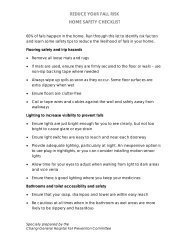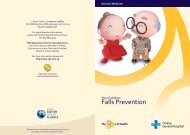Balance, Coordination & Fall Prevention - Changi General Hospital
Balance, Coordination & Fall Prevention - Changi General Hospital
Balance, Coordination & Fall Prevention - Changi General Hospital
You also want an ePaper? Increase the reach of your titles
YUMPU automatically turns print PDFs into web optimized ePapers that Google loves.
REDUCE YOUR FALL RISK<br />
UNDERSTAND HOW YOU CAN PREVENT FALLS BY DEVELOPING<br />
BALANCE COORDINATION AND STRENGTH<br />
EXERCISE FOR FALL PREVENTION<br />
Why is exercise important in reducing the risk of falls?<br />
Exercise builds balance, coordination and strength.<br />
Adequate strength is required to support the body weight as we stand<br />
and walk. Any weakness in the legs means they may not be able to<br />
support your full body weight and lead to a fall.<br />
Body strength is also important for undertaking every day activities such<br />
as getting out of bed, rising from a chair and walking up and down<br />
steps.<br />
The ability to balance – when still or moving – is also important to<br />
ensure that you keep your body upright.<br />
Being able to coordinate well also helps you to react quickly to shifts in<br />
movement, especially if you trip or lose your balance.<br />
What can I do to improve my strength, balance and coordination?<br />
• Exercise is the most effective way to build strength, balance and<br />
coordination<br />
• Exercise classes are particularly beneficial, as any specific balance,<br />
strength or coordination problem can be targeted. Exercising in a<br />
group also provides a structure and social support<br />
• Specific home exercises and increased general exercise such as<br />
walking, gardening provide important additional benefits<br />
• Even simple walking for 20 minutes, three times a week is beneficial<br />
Tips for starting and maintaining an exercise program<br />
• Speak to your doctor and/or physiotherapist before embarking on<br />
an exercise programme<br />
• Begin slowly and gradually build up the amount of exercise you do<br />
Specially prepared by the<br />
<strong>Changi</strong> <strong>General</strong> <strong>Hospital</strong> <strong>Fall</strong> <strong>Prevention</strong> Committee
REDUCE YOUR FALL RISK<br />
UNDERSTAND HOW YOU CAN PREVENT FALLS BY DEVELOPING<br />
BALANCE COORDINATION AND STRENGTH<br />
• You don’t have to do all of the exercise at once. Spread them out<br />
and do some in the morning and some in the evening if you like<br />
• Choose an activity that you enjoy and that you feel comfortable<br />
doing.<br />
• Exercise with a friend or in a group – it is more enjoyable if you have<br />
someone to talk to<br />
• Vary your walk route and choose interesting places to visit, such as<br />
a park or beach<br />
• Don’t exercise during the hottest part of the day<br />
• Set weekly goals that are achievable<br />
• Maintain an exercise diary to monitor your achievements<br />
Specially prepared by the<br />
<strong>Changi</strong> <strong>General</strong> <strong>Hospital</strong> <strong>Fall</strong> <strong>Prevention</strong> Committee
















